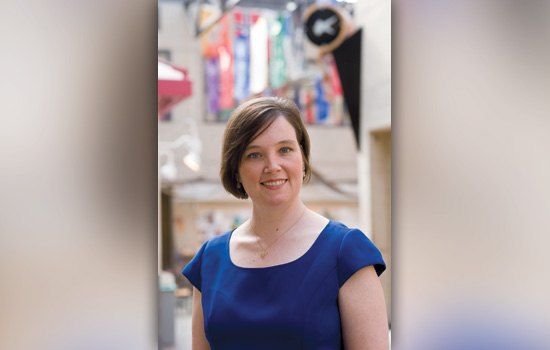Kathleen Anderson
A. Sue Weisler
Kathleen Anderson
Kathleen Anderson ’94 (professional and technical communication) is starting her second two-year term as president of the RIT Alumni Association and is a member of the RIT Board of Trustees. Anderson works as a media director for Travers Collins & Co., a Buffalo-based advertising agency. Anderson says she is a ferocious reader who has a passion for New Orleans. Here are Anderson’s thoughts on the Alumni Association, the future of RIT and her goals for her next term.
I came to RIT for biotechnology, and at the time, RIT was one of the few colleges in the country that had a biotechnology program. And literally, within hours, I realized I didn’t want to spend the rest of my life in a lab so I knew I wasn’t long for the biotechnology world.
I had a short list of majors and I got in the elevator to go see my academic advisor and I hadn’t made a decision and I looked at the gentleman who was in the elevator with me and I said, ‘What is your major?’ And he said, ‘Communication.’ I said, ‘Do you like it?’ And he said, ‘It is fabulous,’ and went on for the entire elevator ride to tell me how amazing the classes were, how attentive the professors were, how he had just gotten back from a co-op and what a valuable experience it was. And in a three-minute elevator ride I became a communication major.
When I was a student here, I was the executive editor for Reporter. And at that time, President Simone was just coming to RIT and one of things he wanted to do was make RIT more of a traditional university. And it was very much like your family—you can say that your sister looks horrible in that dress but nobody else can say it. RIT was a very sterile environment, admittedly. And he came and said he was going to change that and bring some tradition, pride, a true sense of university community, which were all wonderful. However, I did not necessarily agree with him. He was going to have an inauguration and I thought that was a waste of money. And I wrote some very scathing editorials about President Simone.
What ends up happening is, many years later, the president and I start a correspondence. He brought me back and he appointed me as a presidential appointment to the Alumni Board after I less-than-warmly welcomed him to RIT.
Every time I am meeting with alumni, they naturally think of the RIT of their collegiate experience. So regardless of when they graduated, their picture of RIT is 10 years old, 20 years old, 30 years old. And it’s exciting for them to hear about things like the Golisano Institute for Sustainability and Global Village and Park Point and then when they get here, they are amazed. They are proud.
A personal philosophy of mine is that you have an obligation to give back to that which you have benefitted from. So giving back to RIT, to me, morally makes sense. But from a more self-centered perspective, the better that RIT does, the more valuable your degree is. So if there is any way that alumni can contribute to the institute that would help advance RIT, their degree only becomes more valuable. The brand that is RIT only becomes stronger.
There are times when I look back at the editorials I wrote about Dr. Simone and I recognize how harsh they were. And I recognize how myopic they were in their view. But I wouldn’t change it because if I had changed it and never written it, I likely wouldn’t be sitting here today as president of the Alumni Association.
I think if when I’m done that alumni know that the door to the Brick City is always open to them, and that they are always welcome here, and they take advantage of that, then I have succeeded.














